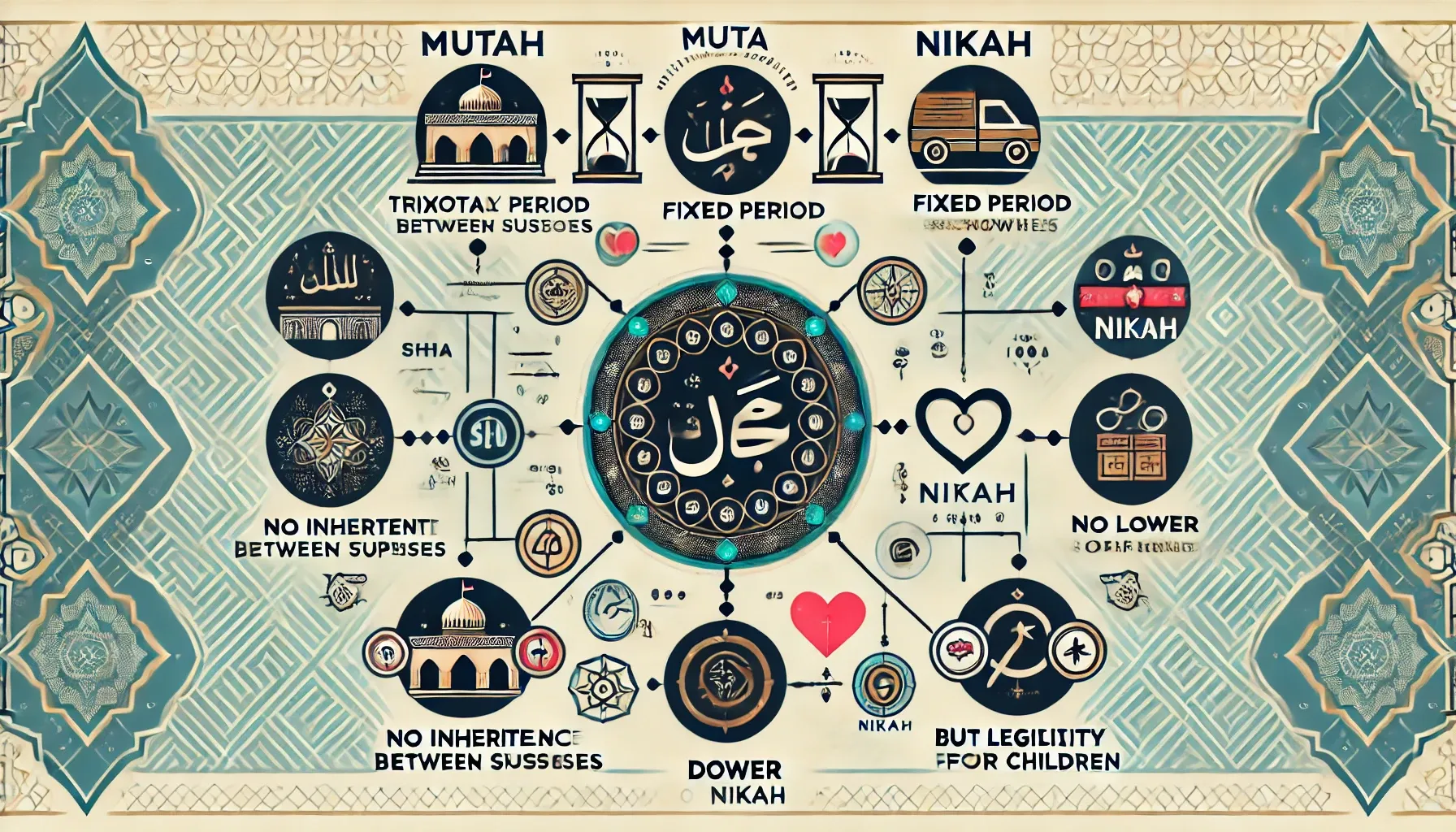Muta marriage, a temporary union in Shia law, sets a defined period and dower. While it provides legitimacy to children, it lacks mutual inheritance rights and maintenance unless specified in the agreement.

Muta Marriage under Shia Law
Shia law, specifically within the Ithana Ashari school, recognizes two types of marriage:
- permanent and
- temporary, also known as muta (derived from an Arab custom meaning "enjoyment" or "use").
The key distinction between these two forms lies in the duration. In a permanent marriage, the duration is indefinite, whereas, in a muta marriage, the period of cohabitation is explicitly defined.
Eligibility for Muta Marriage
A Shia male is permitted to enter into a muta marriage with a woman who follows the Muslim, Christian, or Jewish faiths (collectively referred to as Kitabia), or even with a woman who worships fire. However, a muta marriage cannot be contracted with a woman from other religious backgrounds, such as Hinduism. On the other hand, a Shia woman is prohibited from entering into a muta marriage with a non-Muslim. Importantly, Sunni law does not recognize the concept of muta marriage.
Formalities and Requirements
A Shia male may contract multiple muta marriages without restriction. The formalities of a regular marriage, such as the exchange of offer and acceptance, must be observed. For the validity of a muta marriage, two critical conditions must be met:
- The period of cohabitation must be predetermined (e.g., a day, month, year, etc.).
- The amount of dower (mehar) must be specified. If not, the marriage is considered void.
Muta marriage is seen as a temporary union based on a quid pro quo arrangement, wherein the man receives the services of a woman for a specified period. If no duration is stated, the marriage is regarded as permanent, even if it is labeled as muta.
In the landmark case of Shohrat Singh v. Jafri Bibi[1], the plaintiff's father had lived with her mother for several years before formalizing their relationship with a nikah (permanent marriage) just 1.5 years before her birth. Although the father claimed the initial relationship was a muta marriage with a dower of Rs. 50,000, the plaintiff contended that her two sisters, born before her, were illegitimate and that she was the sole legitimate heir. The court held that there was a presumption of muta marriage, which had later culminated in a nikah, and that the plaintiff's sisters were legitimate. The ruling affirmed that if a muta marriage lacked a specified term but involved cohabitation, it would be presumed to last for the entire period of cohabitation.
Characteristics and Incidents of Muta Marriage
- No Inheritance Rights: There are no mutual rights of inheritance between the spouses in a muta marriage. However, children born from the union are considered legitimate and can inherit from both parents.
- No Maintenance: Unless specified in the agreement, the wife is not entitled to maintenance from her husband during the marriage. She may, however, claim maintenance under Section 125 of the Criminal Procedure Code (Cr.P.C.)[2].
- Dower Rights: If the marriage is consummated, the wife is entitled to the full dower. If not, she is entitled to only half of the dower.
- Iddat Period: If the marriage is consummated, the wife must observe an iddat period of three menstrual cycles after the marriage ends. If no cohabitation occurred, the iddat is not required.
- No Residence Obligation: The husband is not obligated to provide residence for his muta wife.
- Termination: The muta marriage ends upon the expiration of the specified term, mutual consent, or the death of either party. Unlike permanent marriages, the husband does not have the right to divorce but can end the marriage early by offering a "gift of the term." In such cases, the wife is entitled to the full dower.
- Procreation and Early Departure: The husband has the right to refuse procreation (e.g., through izl, or coitus interruptus). If the wife chooses to leave before the end of the marriage term, the husband may deduct a proportional amount of the dower for the unexpired period.
Legal Perspective
Muta marriage is distinct from both regular marriage and prostitution. While it is a temporary arrangement, it is a legitimate form of union under Shia law, providing legal protection for children born from the marriage. It should not be viewed as a marriage of convenience or for pleasure, as it follows specific legal formalities and carries certain rights and responsibilities for both parties. Moreover, there is no minimum duration required for a muta marriage, and the limitation on the number of wives (restricted to four in regular marriages) does not apply in the case of muta marriages.
Distinction Between Muta and Nikah
[1] (1915) 17 BOMLR 13.
[2] The Code of Criminal Procedure, 1973, s. 125.
[3] Ibid.


